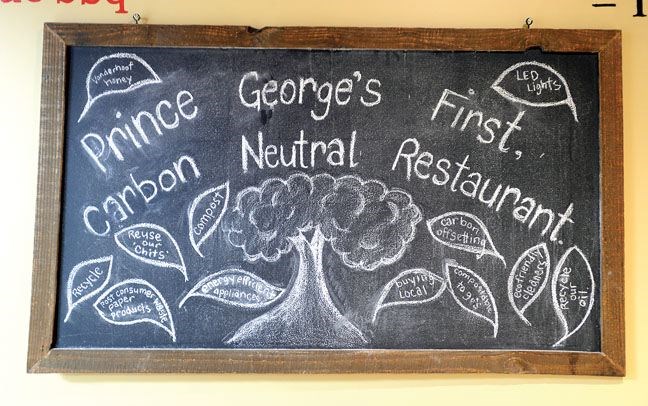There are a number of things restaurants can do to reduce their impact on the environment.
When restaurants are renovating, they can purchase energy efficient appliances, use LED lighting, and purchase hand dryers in the bathrooms to cut down on paper towel waste, said Terri McClymont, executive director of Recycling and Environmental Action Planning Society (REAPS).
"When we built The Copper Pig almost four years ago we bought energy efficient materials and retrofitted our light bulbs with LEDs, which brought the lighting portion of our energy bill down by 91 per cent," said Tyler Burbee, owner of The Cooper Pig.
Have a look at utilities bills to see if there are significant fluctuations in the use of energy and adjust accordingly by changing out light bulbs, using motion sensors and powering down computers at night. Conduct an energy audit and look at reductions strategies for the business and its operations.
Look at your green purchases, said McClymont.
"What are you purchasing and what are you bringing into your business - is there a green initiative attached to it - is there less packaging?" asked McClymont. "Is the manufacturing of the product done in a sustainable fashion? Does it contain toxic materials or ozone depleting substances? Can it be recycled or is it made from recycled materials? Is it made from renewal materials?"
Is the item repairable so that when it breaks it can be fixed and it doesn't have to be thrown away, she added.
And then there's the solid waste.
"Get to know your garbage," said McClymont. "Look into it at the end of the day and ask yourself if there's a way to reduce, reuse and recycle."
There are ways to get rid of kitchen waste.
"REAPS will take your organics," said McClymont. REAPS takes the kitchen waste from nine local restaurants. "So all the fruit and vegetable trims, coffee grinds, filters, flowers and tea bags. But we can't take the plate waste. So you'll have to find a pig or chicken farmer who can handle that."
Composting is probably one of the biggest things the Copper Pig does, said Burbee.
"We have between 20 and 60 litres a day that is composted," he added.
Twice a week, the compost is picked up by Wolfe Farms, which is just a 20 minute drive from the restaurant.
"They use the compost, including the coffee grinds as fertilizer and the vegetable compost is fed to the chicken and pigs that we use in our restaurant," said Burbee.
It comes full circle.
"Restaurants should look at food securities by trying to buy locally whenever possible," said McClymont.
Also look at how waste is disposed.
"Is the bin in the back of your business far too big for the amount of waste you are generating?" asked McClymont. "Could you cut down on your rental fee by reducing the size of your garbage container? Look at what's recyclable in Prince George. So you have all your paper products, plastic, tin cans, beverage containers, lighting - there's 78 different things that can be recycled."
Think about changing products from those that are not recyclable to those that are like post-consumer recycled paper products, she added.
"Work with other businesses to share the recycling cost," said McClymont.
There are several options for take out containers. There are compostable containers now that can go into the garbage but they take less time to break down quicker in the landfill, McClymont added. There's also recyclable plastic as well as cardboard boxes that can go into the paper stream of recycling as opposed to into the garbage can.
"Get rid of those plastic bottles," said McClymont. "Ensure that you have glassware for your employees instead of having disposable coffee cups. Ask suppliers to find out about their policies. All of it does add up."
Use cold water rather than hot whenever possible and keep equipment in good shape so that it runs efficiently.
Make sure plumbing and heating are as efficient as possible, install low flush toilets and aerators on taps, turn down the water temperature in your tank settings, keep jugs of water in the fridge instead of always running tap water for clients.
"It's not like we're reinventing the wheel here, check around to see what's available and talk to other businesses to see what they're doing," said McClymont.
REAPS conducts waste audits to help businesses get on the right track.
"The staff at The Copper Pig was big into recycling right from the beginning and we recycle everything - we even recycle our bottle caps," said Burbee.
For more information call REAPS at 250-561-7327.



